 Tammy VanDeGrift is a graduate student in the Computer Science and
Engineering Department at the University of Washington, Seattle
campus. She earned a B.A. in Computer Science and Mathematics at
Gustavus Adolphus College in 1999 and earned her M.S. in Computer
Science at the University of Washington in 2001. She hopes to earn
her doctorate soon. Her interests include computer science education,
human-computer interaction, and software engineering. In particular,
she is interested in teaching practices (including pair programming,
collaborative learning, and assessment) and novice/expert conceptions
of software design and design practices.
Tammy VanDeGrift is a graduate student in the Computer Science and
Engineering Department at the University of Washington, Seattle
campus. She earned a B.A. in Computer Science and Mathematics at
Gustavus Adolphus College in 1999 and earned her M.S. in Computer
Science at the University of Washington in 2001. She hopes to earn
her doctorate soon. Her interests include computer science education,
human-computer interaction, and software engineering. In particular,
she is interested in teaching practices (including pair programming,
collaborative learning, and assessment) and novice/expert conceptions
of software design and design practices.
|
 Anna Eckerdal: I am a PhD student in Scientific Computing. I
study students' learning processes within university courses in
programming, with a view to identify learning resources that promote
understanding of object-oriented concepts. The title of my thesis is
"Resources for learning object-oriented programming". I have been
teaching mathematics, physics and computer science in High school
since 1982. Since 1999 I have been a lecturer at Uppsala university,
teaching C++ and Java programming at undergraduate courses. In
September 2001 I was admitted as a PhD student. Teaching and learning
have always interested me, and now I look forward to meeting other
researchers working with similar questions to discuss and find broader
perspectives. I am interested in different pedagogical perspectives
and theories, and to learn to perform both quantitative and
qualitative studies.
Anna Eckerdal: I am a PhD student in Scientific Computing. I
study students' learning processes within university courses in
programming, with a view to identify learning resources that promote
understanding of object-oriented concepts. The title of my thesis is
"Resources for learning object-oriented programming". I have been
teaching mathematics, physics and computer science in High school
since 1982. Since 1999 I have been a lecturer at Uppsala university,
teaching C++ and Java programming at undergraduate courses. In
September 2001 I was admitted as a PhD student. Teaching and learning
have always interested me, and now I look forward to meeting other
researchers working with similar questions to discuss and find broader
perspectives. I am interested in different pedagogical perspectives
and theories, and to learn to perform both quantitative and
qualitative studies.
|
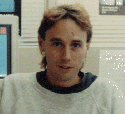 Robert McCartney is an Associate Professor in the Computer
Science and Engineering department at the University of
Connecticut. His education was at the University of Michican (B.S.,
M.S.) in Natural Resources and at Brown University (Sc.M, Ph.D) in
Computer Science. His research has been primarily in AI and robotics,
but has some background in CS Education research as well, including
serving on the editorial board of Computer Science Education since the
mid-1990.
Robert McCartney is an Associate Professor in the Computer
Science and Engineering department at the University of
Connecticut. His education was at the University of Michican (B.S.,
M.S.) in Natural Resources and at Brown University (Sc.M, Ph.D) in
Computer Science. His research has been primarily in AI and robotics,
but has some background in CS Education research as well, including
serving on the editorial board of Computer Science Education since the
mid-1990.
|
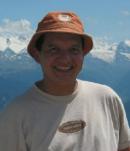 Alvaro Monge is an associate professor in the Department of Computer
Engineering and Computer Science at California State University Long
Beach. He joined CSULB in 1999 after being an assistant professor at
the University of Dayton, Ohio. Alvaro holds a B.S. in Computer
Science (University of California Riverside, 1991) and M.S. and Ph.D.
in Computer Science (University of California San Diego, 1993 and
1997). His scholarly interests include database systems, integration
of information, and computer science education.
Alvaro Monge is an associate professor in the Department of Computer
Engineering and Computer Science at California State University Long
Beach. He joined CSULB in 1999 after being an assistant professor at
the University of Dayton, Ohio. Alvaro holds a B.S. in Computer
Science (University of California Riverside, 1991) and M.S. and Ph.D.
in Computer Science (University of California San Diego, 1993 and
1997). His scholarly interests include database systems, integration
of information, and computer science education.
|
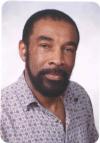 Hubert A. Johnson: I am an Assistant Professor in the Computer
Science Department at Montclair State University, New Jersey. I
received a BS in Mathematics and a MS in Math Ed from Central
Connecticut State University; an M.Ed. and a Doctorate in Math Ed from
Teachers' College, Columbia University, NY. After graduating from
Columbia University I studied Computer Science at the Institute For
Retraining In Computer Science (IFRICS) at Clarkson University,
Potsdam, NY .I have taught a variety of computer science courses here
at Montclair State. These courses include Intro to Programming I and
II, Data Structures, Computer Organization, System Software, Theory of
Digital Machines, and Software Engineering. My areas of interest in
Computer Science Education include (I) integrating software
engineering concepts throughout the computer science curriculum, and
(2) retention and performance enhancement of minorities and the
underrepresented in computer science.
Hubert A. Johnson: I am an Assistant Professor in the Computer
Science Department at Montclair State University, New Jersey. I
received a BS in Mathematics and a MS in Math Ed from Central
Connecticut State University; an M.Ed. and a Doctorate in Math Ed from
Teachers' College, Columbia University, NY. After graduating from
Columbia University I studied Computer Science at the Institute For
Retraining In Computer Science (IFRICS) at Clarkson University,
Potsdam, NY .I have taught a variety of computer science courses here
at Montclair State. These courses include Intro to Programming I and
II, Data Structures, Computer Organization, System Software, Theory of
Digital Machines, and Software Engineering. My areas of interest in
Computer Science Education include (I) integrating software
engineering concepts throughout the computer science curriculum, and
(2) retention and performance enhancement of minorities and the
underrepresented in computer science.
|
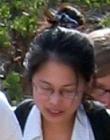 Yi Chen Yi Chen joined the computer science faculty at Pomona
College as an assistant professor in the fall of 2002. She earned BS
degrees in mathematics and computer science from MIT; and MS and PhD
degrees in computer science from UC Berkeley. Her research interests
include parallel computing, algorithms, and sparse matrix
computations.
Yi Chen Yi Chen joined the computer science faculty at Pomona
College as an assistant professor in the fall of 2002. She earned BS
degrees in mathematics and computer science from MIT; and MS and PhD
degrees in computer science from UC Berkeley. Her research interests
include parallel computing, algorithms, and sparse matrix
computations.
|
 Leslie Schwartzman: I teach as an assistant professor in
computer sicnece at Roosevelt University, Chicago, IL (and suburban
campus). My department serves almost entirely a population of working
adults, with a broad range of backgrounds and skill levels. I've
spent six years working in industry, and several more teaching in
adjunct or visiting faculty positions. I began teaching here after
recieving a Ph.D. in fall, 2001. I'm particularly interested in
software design considerations: how to do it really well, how to
teach it (at many levels), how to conceptualize it.
Leslie Schwartzman: I teach as an assistant professor in
computer sicnece at Roosevelt University, Chicago, IL (and suburban
campus). My department serves almost entirely a population of working
adults, with a broad range of backgrounds and skill levels. I've
spent six years working in industry, and several more teaching in
adjunct or visiting faculty positions. I began teaching here after
recieving a Ph.D. in fall, 2001. I'm particularly interested in
software design considerations: how to do it really well, how to
teach it (at many levels), how to conceptualize it.
|
 Anthony Robins is a Senior Lecturer in the Computer Science
Department at the University of Otago (New Zealand). His background
is in Psychology (Canterbury, New Zealand) and Cognitive Science
(Sussex, England). Most of his research has been in the area of
artificial neural networks, especially as models of human learning and
memory. For the last 12 years he has been teaching introductory
programming ("CS1"). This experience has helped to shape a recent
research interest in the topic of novice programmers and the processes
of teaching and learning a first programming language.
Anthony Robins is a Senior Lecturer in the Computer Science
Department at the University of Otago (New Zealand). His background
is in Psychology (Canterbury, New Zealand) and Cognitive Science
(Sussex, England). Most of his research has been in the area of
artificial neural networks, especially as models of human learning and
memory. For the last 12 years he has been teaching introductory
programming ("CS1"). This experience has helped to shape a recent
research interest in the topic of novice programmers and the processes
of teaching and learning a first programming language.
|
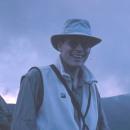 Mark Ratcliffe:I am currently Director of Teaching at the
Department of Computer Science at the University of Wales,
Abersytwyth. I have been teaching Computer Science for the last 14
years. Teaching is my real passion and I have gained seniority in the
department through my efforts with teaching. In recent years I have
developed my research interests in education and in this respect I
have been working hard on two distinct areas: VorteX and Tweek. Full
details are at
http://users.aber.ac.uk/mbr
Mark Ratcliffe:I am currently Director of Teaching at the
Department of Computer Science at the University of Wales,
Abersytwyth. I have been teaching Computer Science for the last 14
years. Teaching is my real passion and I have gained seniority in the
department through my efforts with teaching. In recent years I have
developed my research interests in education and in this respect I
have been working hard on two distinct areas: VorteX and Tweek. Full
details are at
http://users.aber.ac.uk/mbr
ny levels), how to conceptualize it.
|
 Donald Chinn is an Assistant Professor in the Computing and
Software Systems program at the University of Washington, Tacoma. He
received his M.S. and Ph.D. from the University of Washington,
Seattle. Before joining the UWT faculty in 2002, he worked at
Microsoft Corporation for three and a half years and lectured at UW,
Seattle for two years. His research interests include algorithms,
algorithmic analysis, and computer science education.
Donald Chinn is an Assistant Professor in the Computing and
Software Systems program at the University of Washington, Tacoma. He
received his M.S. and Ph.D. from the University of Washington,
Seattle. Before joining the UWT faculty in 2002, he worked at
Microsoft Corporation for three and a half years and lectured at UW,
Seattle for two years. His research interests include algorithms,
algorithmic analysis, and computer science education.
|
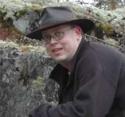 Jan Erik Moström: Well, what can I say about myself? I got a
M.Sc. degree at Luleå University of Technology in 1987, and started to
teach at the Computer Science Department in the same year. In 1998 I
moved to Umeå and in 1999 I started to teach at the Dept. of Computing
Science at Umeå University. In 2002 I earned the degree of
Techonological Licentiate. My teaching has been in the areas of micro
computer technology, electronics, functional programming, imperative
programming, object oriented programming, human computer interaction,
operating systems, systems programming, algorithms and data
structures, project courses, etc, etc. In addition to my work as a
teacher I also work as a system administrator. My current plans
include earning a Ph.D. degree.
Jan Erik Moström: Well, what can I say about myself? I got a
M.Sc. degree at Luleå University of Technology in 1987, and started to
teach at the Computer Science Department in the same year. In 1998 I
moved to Umeå and in 1999 I started to teach at the Dept. of Computing
Science at Umeå University. In 2002 I earned the degree of
Techonological Licentiate. My teaching has been in the areas of micro
computer technology, electronics, functional programming, imperative
programming, object oriented programming, human computer interaction,
operating systems, systems programming, algorithms and data
structures, project courses, etc, etc. In addition to my work as a
teacher I also work as a system administrator. My current plans
include earning a Ph.D. degree.
|
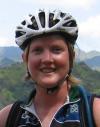 Beth Simon is an assistant professor of Computer Science in the
Mathematics and Computer Science department at the University of San
Diego. Beth holds a B.S. in Computer Science (University of Dayton,
1995) and an M.S. and Ph.D. in Computer Science and Engineering
(University of California, San Diego, 1998 and 2001). Her interests
include high performance computer architectures, compilers,
performance programming, and scientific computing. Specific teaching
interests include computer ethics and "active lecturing" using the
Classroom Presenter lecture presentation system.
Beth Simon is an assistant professor of Computer Science in the
Mathematics and Computer Science department at the University of San
Diego. Beth holds a B.S. in Computer Science (University of Dayton,
1995) and an M.S. and Ph.D. in Computer Science and Engineering
(University of California, San Diego, 1998 and 2001). Her interests
include high performance computer architectures, compilers,
performance programming, and scientific computing. Specific teaching
interests include computer ethics and "active lecturing" using the
Classroom Presenter lecture presentation system.
|
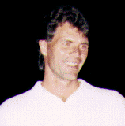 Ken Blaha is an Associate Professor in the Computer Science and
Computer Engineering Department at Pacific Lutheran University. PLU is
a small liberal arts university in Tacoma, Washington. Ken has a
M.S. in Mathematics and a Ph.D. in Computer Science both from the
University of Oregon. His research interests include computational
complexity and algebraic algorithms, but more recently he has focused
on areas in computer science education related to active learning in
the classroom and assessment.
Ken Blaha is an Associate Professor in the Computer Science and
Computer Engineering Department at Pacific Lutheran University. PLU is
a small liberal arts university in Tacoma, Washington. Ken has a
M.S. in Mathematics and a Ph.D. in Computer Science both from the
University of Oregon. His research interests include computational
complexity and algebraic algorithms, but more recently he has focused
on areas in computer science education related to active learning in
the classroom and assessment.
|
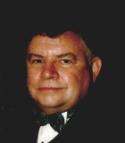 Dean Sanders is a professor in the Department of Computer
Science/Information Systems at Northwest Missouri State University.
He has a B.S. degree in mathematics from Western Michigan University,
an M.S. and Ph.D. in mathematics from Michigan State University, and
he studied for an M.S. in computer science at The Ohio State
University. He has been teaching computer science since the late
1970's. His primary teaching/research interests are software
engineering and introductory computer programming. Last year, he
worked with a recent graduate to develop Jeroo, an object-oriented
relative of Karel the Robot. Currently, he is working on developing a
package that beginning students can use to develop graphical user
interfaces rather easily. Enough with the third person. My wife and
I have three children and two grandchildren, both less than one year
old. In the summer, we spend a lot of time in our vegetable and
flower gardens. Throughout the year, I work on remodeling and
renovating our country house. When I have time, I enjoy hiking and
photographing nature.
Dean Sanders is a professor in the Department of Computer
Science/Information Systems at Northwest Missouri State University.
He has a B.S. degree in mathematics from Western Michigan University,
an M.S. and Ph.D. in mathematics from Michigan State University, and
he studied for an M.S. in computer science at The Ohio State
University. He has been teaching computer science since the late
1970's. His primary teaching/research interests are software
engineering and introductory computer programming. Last year, he
worked with a recent graduate to develop Jeroo, an object-oriented
relative of Karel the Robot. Currently, he is working on developing a
package that beginning students can use to develop graphical user
interfaces rather easily. Enough with the third person. My wife and
I have three children and two grandchildren, both less than one year
old. In the summer, we spend a lot of time in our vegetable and
flower gardens. Throughout the year, I work on remodeling and
renovating our country house. When I have time, I enjoy hiking and
photographing nature.
|
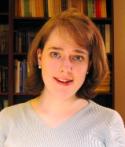 Allison Elliott Tew is an administrator and member of the
instructional faculty in the College of Computing at the Georgia
Institute of Technology. She earned her Bachelor's and Masters
degrees in Computer Science at Georgia Tech, concentrating in Software
Engineering, Educational Technology, & Human Computer Interaction.
Before joining the faculty, Allison worked as a Project Manager in the
consulting industry. Her current research interests focus on the role
of collaboration in learning and opportunities for contextualizing
introductory CS education.
Allison Elliott Tew is an administrator and member of the
instructional faculty in the College of Computing at the Georgia
Institute of Technology. She earned her Bachelor's and Masters
degrees in Computer Science at Georgia Tech, concentrating in Software
Engineering, Educational Technology, & Human Computer Interaction.
Before joining the faculty, Allison worked as a Project Manager in the
consulting industry. Her current research interests focus on the role
of collaboration in learning and opportunities for contextualizing
introductory CS education.
|
 Steve Cooper is an associate professor in the Department of
Mathematics and Computer Science at Saint Joseph's University. His
education was at Cornell University (B.A.) in mathematics and
chiemistry, and at Syracuse University (M.S., Ph.D) in Computer
Science. His research has been primarily in programming language
semantics, and has been working in CS Education as well over the past
5 years, primarily with a 3d interactive animation environment, Alice,
for helping novices to learn programming.
Steve Cooper is an associate professor in the Department of
Mathematics and Computer Science at Saint Joseph's University. His
education was at Cornell University (B.A.) in mathematics and
chiemistry, and at Syracuse University (M.S., Ph.D) in Computer
Science. His research has been primarily in programming language
semantics, and has been working in CS Education as well over the past
5 years, primarily with a 3d interactive animation environment, Alice,
for helping novices to learn programming.
|
 Kris Powers is an assistant professor of computer science in
the Department of Mathematics and Computer Science at Berry College in
northwest Georgia. She has a B.S. degree from the College of
Charleston and a Ph. D. degree from the University of Illinois -
Urbana, both in computer science. Her technical research interests
center on graph theoretic aspects of system communication, while her
educational research interests focus on teaching methods, especially
those based on constructivist theories. She recently has taken over
the position of National Membership Secretary for the Consortium for
Computing Sciences at Colleges (CCSC).
Kris Powers is an assistant professor of computer science in
the Department of Mathematics and Computer Science at Berry College in
northwest Georgia. She has a B.S. degree from the College of
Charleston and a Ph. D. degree from the University of Illinois -
Urbana, both in computer science. Her technical research interests
center on graph theoretic aspects of system communication, while her
educational research interests focus on teaching methods, especially
those based on constructivist theories. She recently has taken over
the position of National Membership Secretary for the Consortium for
Computing Sciences at Colleges (CCSC).
|
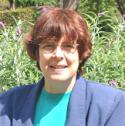 Carol Stoker is an Associate Professor at Azusa Pacific University, a
Christian Liberal Arts university. I received my B.A. (Theater Arts) from
the University of California, Riverside, my M.S. (Educational Computing)
from Pepperdine, and my Ph.D. (Education) from the University of Southern
California. I started teaching at APU, after receiving my masters, and
earned my Ph.D. while working full time. Teaching is my passion. The
courses that I teach include: non-majors course, beginning programming,
intermediate programming, operating systems, GUI design, and Senior Seminar
(research course focusing on ethics in computing and IT careers). My newest
project is using Lego Mindstorms Robots to teach programming skills to
nonmajors.
Carol Stoker is an Associate Professor at Azusa Pacific University, a
Christian Liberal Arts university. I received my B.A. (Theater Arts) from
the University of California, Riverside, my M.S. (Educational Computing)
from Pepperdine, and my Ph.D. (Education) from the University of Southern
California. I started teaching at APU, after receiving my masters, and
earned my Ph.D. while working full time. Teaching is my passion. The
courses that I teach include: non-majors course, beginning programming,
intermediate programming, operating systems, GUI design, and Senior Seminar
(research course focusing on ethics in computing and IT careers). My newest
project is using Lego Mindstorms Robots to teach programming skills to
nonmajors.
|
 Sally Fincher is a Lecturer in the Computing Laboratory at the
University of Kent at Canterbury, where she heads the Computers
and Education Research Group. Sally holds a B.A. in Philosophy &
Computer Science (University of Kent, UK) and an M.A. in English
(Georgetown, Washington DC). Sally is Editor of Computer Science
Education, jointly with Renee Macaulay. Her principal research areas
are Computer Science Education and patterns and pattern languages,
especially patterns for HCI.
Sally Fincher is a Lecturer in the Computing Laboratory at the
University of Kent at Canterbury, where she heads the Computers
and Education Research Group. Sally holds a B.A. in Philosophy &
Computer Science (University of Kent, UK) and an M.A. in English
(Georgetown, Washington DC). Sally is Editor of Computer Science
Education, jointly with Renee Macaulay. Her principal research areas
are Computer Science Education and patterns and pattern languages,
especially patterns for HCI. Marian Petre is a Reader in the Computing Department at the Open
University and holds an Advanced Research Fellowship awarded by the
UK's Engineering and Physical Sciences Research Council. Until
recently, she was Director of the Centre for Informatics Education
Research (CIER) at the Open University. Marian holds a B.A. in
Psycholinguistics (Swarthmore College) and a Ph.D. in Computer Science
(University College London, UK). Her principal research areas are
expert reasoning and representation in the design of computer systems,
and Computer Science education. She lectures internationally on
empirical methods.
Marian Petre is a Reader in the Computing Department at the Open
University and holds an Advanced Research Fellowship awarded by the
UK's Engineering and Physical Sciences Research Council. Until
recently, she was Director of the Centre for Informatics Education
Research (CIER) at the Open University. Marian holds a B.A. in
Psycholinguistics (Swarthmore College) and a Ph.D. in Computer Science
(University College London, UK). Her principal research areas are
expert reasoning and representation in the design of computer systems,
and Computer Science education. She lectures internationally on
empirical methods. Josh Tenenberg is an Associate Professor in the
Computing and Software
Systems program in the newly established Institute of Technology at
the University of Washington, Tacoma. He joined UWT in 2000 from
Indiana University South Bend, where he was the Associate Chair for
Computer Science in the Department of Mathematics and Computer
Science and was a member of the Faculty Colloquium on Excellence in
Teaching. Josh holds a B.M. in Music (San Francisco State University),
and a M.S. and Ph.D. in Computer Science (University of Rochester).
His research interests have included automated planning and reasoning,
reinforcement learning, and temporal logic. Recently, he has been
investigating cognitive models of computer program
comprehension, Computer Science Education, and critical
theories of technology. Sally, Marian, and Josh have
collaborated on the series of NSF-sponsored
Josh Tenenberg is an Associate Professor in the
Computing and Software
Systems program in the newly established Institute of Technology at
the University of Washington, Tacoma. He joined UWT in 2000 from
Indiana University South Bend, where he was the Associate Chair for
Computer Science in the Department of Mathematics and Computer
Science and was a member of the Faculty Colloquium on Excellence in
Teaching. Josh holds a B.M. in Music (San Francisco State University),
and a M.S. and Ph.D. in Computer Science (University of Rochester).
His research interests have included automated planning and reasoning,
reinforcement learning, and temporal logic. Recently, he has been
investigating cognitive models of computer program
comprehension, Computer Science Education, and critical
theories of technology. Sally, Marian, and Josh have
collaborated on the series of NSF-sponsored  Tammy VanDeGrift is a graduate student in the Computer Science and
Engineering Department at the University of Washington, Seattle
campus. She earned a B.A. in Computer Science and Mathematics at
Gustavus Adolphus College in 1999 and earned her M.S. in Computer
Science at the University of Washington in 2001. She hopes to earn
her doctorate soon. Her interests include computer science education,
human-computer interaction, and software engineering. In particular,
she is interested in teaching practices (including pair programming,
collaborative learning, and assessment) and novice/expert conceptions
of software design and design practices.
Tammy VanDeGrift is a graduate student in the Computer Science and
Engineering Department at the University of Washington, Seattle
campus. She earned a B.A. in Computer Science and Mathematics at
Gustavus Adolphus College in 1999 and earned her M.S. in Computer
Science at the University of Washington in 2001. She hopes to earn
her doctorate soon. Her interests include computer science education,
human-computer interaction, and software engineering. In particular,
she is interested in teaching practices (including pair programming,
collaborative learning, and assessment) and novice/expert conceptions
of software design and design practices.
 Anna Eckerdal: I am a PhD student in Scientific Computing. I
study students' learning processes within university courses in
programming, with a view to identify learning resources that promote
understanding of object-oriented concepts. The title of my thesis is
"Resources for learning object-oriented programming". I have been
teaching mathematics, physics and computer science in High school
since 1982. Since 1999 I have been a lecturer at Uppsala university,
teaching C++ and Java programming at undergraduate courses. In
September 2001 I was admitted as a PhD student. Teaching and learning
have always interested me, and now I look forward to meeting other
researchers working with similar questions to discuss and find broader
perspectives. I am interested in different pedagogical perspectives
and theories, and to learn to perform both quantitative and
qualitative studies.
Anna Eckerdal: I am a PhD student in Scientific Computing. I
study students' learning processes within university courses in
programming, with a view to identify learning resources that promote
understanding of object-oriented concepts. The title of my thesis is
"Resources for learning object-oriented programming". I have been
teaching mathematics, physics and computer science in High school
since 1982. Since 1999 I have been a lecturer at Uppsala university,
teaching C++ and Java programming at undergraduate courses. In
September 2001 I was admitted as a PhD student. Teaching and learning
have always interested me, and now I look forward to meeting other
researchers working with similar questions to discuss and find broader
perspectives. I am interested in different pedagogical perspectives
and theories, and to learn to perform both quantitative and
qualitative studies.
 Robert McCartney is an Associate Professor in the Computer
Science and Engineering department at the University of
Connecticut. His education was at the University of Michican (B.S.,
M.S.) in Natural Resources and at Brown University (Sc.M, Ph.D) in
Computer Science. His research has been primarily in AI and robotics,
but has some background in CS Education research as well, including
serving on the editorial board of Computer Science Education since the
mid-1990.
Robert McCartney is an Associate Professor in the Computer
Science and Engineering department at the University of
Connecticut. His education was at the University of Michican (B.S.,
M.S.) in Natural Resources and at Brown University (Sc.M, Ph.D) in
Computer Science. His research has been primarily in AI and robotics,
but has some background in CS Education research as well, including
serving on the editorial board of Computer Science Education since the
mid-1990.
 Alvaro Monge is an associate professor in the Department of Computer
Engineering and Computer Science at California State University Long
Beach. He joined CSULB in 1999 after being an assistant professor at
the University of Dayton, Ohio. Alvaro holds a B.S. in Computer
Science (University of California Riverside, 1991) and M.S. and Ph.D.
in Computer Science (University of California San Diego, 1993 and
1997). His scholarly interests include database systems, integration
of information, and computer science education.
Alvaro Monge is an associate professor in the Department of Computer
Engineering and Computer Science at California State University Long
Beach. He joined CSULB in 1999 after being an assistant professor at
the University of Dayton, Ohio. Alvaro holds a B.S. in Computer
Science (University of California Riverside, 1991) and M.S. and Ph.D.
in Computer Science (University of California San Diego, 1993 and
1997). His scholarly interests include database systems, integration
of information, and computer science education.
 Hubert A. Johnson: I am an Assistant Professor in the Computer
Science Department at Montclair State University, New Jersey. I
received a BS in Mathematics and a MS in Math Ed from Central
Connecticut State University; an M.Ed. and a Doctorate in Math Ed from
Teachers' College, Columbia University, NY. After graduating from
Columbia University I studied Computer Science at the Institute For
Retraining In Computer Science (IFRICS) at Clarkson University,
Potsdam, NY .I have taught a variety of computer science courses here
at Montclair State. These courses include Intro to Programming I and
II, Data Structures, Computer Organization, System Software, Theory of
Digital Machines, and Software Engineering. My areas of interest in
Computer Science Education include (I) integrating software
engineering concepts throughout the computer science curriculum, and
(2) retention and performance enhancement of minorities and the
underrepresented in computer science.
Hubert A. Johnson: I am an Assistant Professor in the Computer
Science Department at Montclair State University, New Jersey. I
received a BS in Mathematics and a MS in Math Ed from Central
Connecticut State University; an M.Ed. and a Doctorate in Math Ed from
Teachers' College, Columbia University, NY. After graduating from
Columbia University I studied Computer Science at the Institute For
Retraining In Computer Science (IFRICS) at Clarkson University,
Potsdam, NY .I have taught a variety of computer science courses here
at Montclair State. These courses include Intro to Programming I and
II, Data Structures, Computer Organization, System Software, Theory of
Digital Machines, and Software Engineering. My areas of interest in
Computer Science Education include (I) integrating software
engineering concepts throughout the computer science curriculum, and
(2) retention and performance enhancement of minorities and the
underrepresented in computer science.
 Yi Chen Yi Chen joined the computer science faculty at Pomona
College as an assistant professor in the fall of 2002. She earned BS
degrees in mathematics and computer science from MIT; and MS and PhD
degrees in computer science from UC Berkeley. Her research interests
include parallel computing, algorithms, and sparse matrix
computations.
Yi Chen Yi Chen joined the computer science faculty at Pomona
College as an assistant professor in the fall of 2002. She earned BS
degrees in mathematics and computer science from MIT; and MS and PhD
degrees in computer science from UC Berkeley. Her research interests
include parallel computing, algorithms, and sparse matrix
computations.
 Leslie Schwartzman: I teach as an assistant professor in
computer sicnece at Roosevelt University, Chicago, IL (and suburban
campus). My department serves almost entirely a population of working
adults, with a broad range of backgrounds and skill levels. I've
spent six years working in industry, and several more teaching in
adjunct or visiting faculty positions. I began teaching here after
recieving a Ph.D. in fall, 2001. I'm particularly interested in
software design considerations: how to do it really well, how to
teach it (at many levels), how to conceptualize it.
Leslie Schwartzman: I teach as an assistant professor in
computer sicnece at Roosevelt University, Chicago, IL (and suburban
campus). My department serves almost entirely a population of working
adults, with a broad range of backgrounds and skill levels. I've
spent six years working in industry, and several more teaching in
adjunct or visiting faculty positions. I began teaching here after
recieving a Ph.D. in fall, 2001. I'm particularly interested in
software design considerations: how to do it really well, how to
teach it (at many levels), how to conceptualize it.
 Anthony Robins is a Senior Lecturer in the Computer Science
Department at the University of Otago (New Zealand). His background
is in Psychology (Canterbury, New Zealand) and Cognitive Science
(Sussex, England). Most of his research has been in the area of
artificial neural networks, especially as models of human learning and
memory. For the last 12 years he has been teaching introductory
programming ("CS1"). This experience has helped to shape a recent
research interest in the topic of novice programmers and the processes
of teaching and learning a first programming language.
Anthony Robins is a Senior Lecturer in the Computer Science
Department at the University of Otago (New Zealand). His background
is in Psychology (Canterbury, New Zealand) and Cognitive Science
(Sussex, England). Most of his research has been in the area of
artificial neural networks, especially as models of human learning and
memory. For the last 12 years he has been teaching introductory
programming ("CS1"). This experience has helped to shape a recent
research interest in the topic of novice programmers and the processes
of teaching and learning a first programming language.
 Mark Ratcliffe:I am currently Director of Teaching at the
Department of Computer Science at the University of Wales,
Abersytwyth. I have been teaching Computer Science for the last 14
years. Teaching is my real passion and I have gained seniority in the
department through my efforts with teaching. In recent years I have
developed my research interests in education and in this respect I
have been working hard on two distinct areas: VorteX and Tweek. Full
details are at
Mark Ratcliffe:I am currently Director of Teaching at the
Department of Computer Science at the University of Wales,
Abersytwyth. I have been teaching Computer Science for the last 14
years. Teaching is my real passion and I have gained seniority in the
department through my efforts with teaching. In recent years I have
developed my research interests in education and in this respect I
have been working hard on two distinct areas: VorteX and Tweek. Full
details are at  Donald Chinn is an Assistant Professor in the Computing and
Software Systems program at the University of Washington, Tacoma. He
received his M.S. and Ph.D. from the University of Washington,
Seattle. Before joining the UWT faculty in 2002, he worked at
Microsoft Corporation for three and a half years and lectured at UW,
Seattle for two years. His research interests include algorithms,
algorithmic analysis, and computer science education.
Donald Chinn is an Assistant Professor in the Computing and
Software Systems program at the University of Washington, Tacoma. He
received his M.S. and Ph.D. from the University of Washington,
Seattle. Before joining the UWT faculty in 2002, he worked at
Microsoft Corporation for three and a half years and lectured at UW,
Seattle for two years. His research interests include algorithms,
algorithmic analysis, and computer science education.
 Jan Erik Moström: Well, what can I say about myself? I got a
M.Sc. degree at Luleå University of Technology in 1987, and started to
teach at the Computer Science Department in the same year. In 1998 I
moved to Umeå and in 1999 I started to teach at the Dept. of Computing
Science at Umeå University. In 2002 I earned the degree of
Techonological Licentiate. My teaching has been in the areas of micro
computer technology, electronics, functional programming, imperative
programming, object oriented programming, human computer interaction,
operating systems, systems programming, algorithms and data
structures, project courses, etc, etc. In addition to my work as a
teacher I also work as a system administrator. My current plans
include earning a Ph.D. degree.
Jan Erik Moström: Well, what can I say about myself? I got a
M.Sc. degree at Luleå University of Technology in 1987, and started to
teach at the Computer Science Department in the same year. In 1998 I
moved to Umeå and in 1999 I started to teach at the Dept. of Computing
Science at Umeå University. In 2002 I earned the degree of
Techonological Licentiate. My teaching has been in the areas of micro
computer technology, electronics, functional programming, imperative
programming, object oriented programming, human computer interaction,
operating systems, systems programming, algorithms and data
structures, project courses, etc, etc. In addition to my work as a
teacher I also work as a system administrator. My current plans
include earning a Ph.D. degree.
 Beth Simon is an assistant professor of Computer Science in the
Mathematics and Computer Science department at the University of San
Diego. Beth holds a B.S. in Computer Science (University of Dayton,
1995) and an M.S. and Ph.D. in Computer Science and Engineering
(University of California, San Diego, 1998 and 2001). Her interests
include high performance computer architectures, compilers,
performance programming, and scientific computing. Specific teaching
interests include computer ethics and "active lecturing" using the
Classroom Presenter lecture presentation system.
Beth Simon is an assistant professor of Computer Science in the
Mathematics and Computer Science department at the University of San
Diego. Beth holds a B.S. in Computer Science (University of Dayton,
1995) and an M.S. and Ph.D. in Computer Science and Engineering
(University of California, San Diego, 1998 and 2001). Her interests
include high performance computer architectures, compilers,
performance programming, and scientific computing. Specific teaching
interests include computer ethics and "active lecturing" using the
Classroom Presenter lecture presentation system.
 Ken Blaha is an Associate Professor in the Computer Science and
Computer Engineering Department at Pacific Lutheran University. PLU is
a small liberal arts university in Tacoma, Washington. Ken has a
M.S. in Mathematics and a Ph.D. in Computer Science both from the
University of Oregon. His research interests include computational
complexity and algebraic algorithms, but more recently he has focused
on areas in computer science education related to active learning in
the classroom and assessment.
Ken Blaha is an Associate Professor in the Computer Science and
Computer Engineering Department at Pacific Lutheran University. PLU is
a small liberal arts university in Tacoma, Washington. Ken has a
M.S. in Mathematics and a Ph.D. in Computer Science both from the
University of Oregon. His research interests include computational
complexity and algebraic algorithms, but more recently he has focused
on areas in computer science education related to active learning in
the classroom and assessment.
 Dean Sanders is a professor in the Department of Computer
Science/Information Systems at Northwest Missouri State University.
He has a B.S. degree in mathematics from Western Michigan University,
an M.S. and Ph.D. in mathematics from Michigan State University, and
he studied for an M.S. in computer science at The Ohio State
University. He has been teaching computer science since the late
1970's. His primary teaching/research interests are software
engineering and introductory computer programming. Last year, he
worked with a recent graduate to develop Jeroo, an object-oriented
relative of Karel the Robot. Currently, he is working on developing a
package that beginning students can use to develop graphical user
interfaces rather easily. Enough with the third person. My wife and
I have three children and two grandchildren, both less than one year
old. In the summer, we spend a lot of time in our vegetable and
flower gardens. Throughout the year, I work on remodeling and
renovating our country house. When I have time, I enjoy hiking and
photographing nature.
Dean Sanders is a professor in the Department of Computer
Science/Information Systems at Northwest Missouri State University.
He has a B.S. degree in mathematics from Western Michigan University,
an M.S. and Ph.D. in mathematics from Michigan State University, and
he studied for an M.S. in computer science at The Ohio State
University. He has been teaching computer science since the late
1970's. His primary teaching/research interests are software
engineering and introductory computer programming. Last year, he
worked with a recent graduate to develop Jeroo, an object-oriented
relative of Karel the Robot. Currently, he is working on developing a
package that beginning students can use to develop graphical user
interfaces rather easily. Enough with the third person. My wife and
I have three children and two grandchildren, both less than one year
old. In the summer, we spend a lot of time in our vegetable and
flower gardens. Throughout the year, I work on remodeling and
renovating our country house. When I have time, I enjoy hiking and
photographing nature.
 Allison Elliott Tew is an administrator and member of the
instructional faculty in the College of Computing at the Georgia
Institute of Technology. She earned her Bachelor's and Masters
degrees in Computer Science at Georgia Tech, concentrating in Software
Engineering, Educational Technology, & Human Computer Interaction.
Before joining the faculty, Allison worked as a Project Manager in the
consulting industry. Her current research interests focus on the role
of collaboration in learning and opportunities for contextualizing
introductory CS education.
Allison Elliott Tew is an administrator and member of the
instructional faculty in the College of Computing at the Georgia
Institute of Technology. She earned her Bachelor's and Masters
degrees in Computer Science at Georgia Tech, concentrating in Software
Engineering, Educational Technology, & Human Computer Interaction.
Before joining the faculty, Allison worked as a Project Manager in the
consulting industry. Her current research interests focus on the role
of collaboration in learning and opportunities for contextualizing
introductory CS education.
 Steve Cooper is an associate professor in the Department of
Mathematics and Computer Science at Saint Joseph's University. His
education was at Cornell University (B.A.) in mathematics and
chiemistry, and at Syracuse University (M.S., Ph.D) in Computer
Science. His research has been primarily in programming language
semantics, and has been working in CS Education as well over the past
5 years, primarily with a 3d interactive animation environment, Alice,
for helping novices to learn programming.
Steve Cooper is an associate professor in the Department of
Mathematics and Computer Science at Saint Joseph's University. His
education was at Cornell University (B.A.) in mathematics and
chiemistry, and at Syracuse University (M.S., Ph.D) in Computer
Science. His research has been primarily in programming language
semantics, and has been working in CS Education as well over the past
5 years, primarily with a 3d interactive animation environment, Alice,
for helping novices to learn programming.
 Kris Powers is an assistant professor of computer science in
the Department of Mathematics and Computer Science at Berry College in
northwest Georgia. She has a B.S. degree from the College of
Charleston and a Ph. D. degree from the University of Illinois -
Urbana, both in computer science. Her technical research interests
center on graph theoretic aspects of system communication, while her
educational research interests focus on teaching methods, especially
those based on constructivist theories. She recently has taken over
the position of National Membership Secretary for the Consortium for
Computing Sciences at Colleges (CCSC).
Kris Powers is an assistant professor of computer science in
the Department of Mathematics and Computer Science at Berry College in
northwest Georgia. She has a B.S. degree from the College of
Charleston and a Ph. D. degree from the University of Illinois -
Urbana, both in computer science. Her technical research interests
center on graph theoretic aspects of system communication, while her
educational research interests focus on teaching methods, especially
those based on constructivist theories. She recently has taken over
the position of National Membership Secretary for the Consortium for
Computing Sciences at Colleges (CCSC).
 Carol Stoker is an Associate Professor at Azusa Pacific University, a
Christian Liberal Arts university. I received my B.A. (Theater Arts) from
the University of California, Riverside, my M.S. (Educational Computing)
from Pepperdine, and my Ph.D. (Education) from the University of Southern
California. I started teaching at APU, after receiving my masters, and
earned my Ph.D. while working full time. Teaching is my passion. The
courses that I teach include: non-majors course, beginning programming,
intermediate programming, operating systems, GUI design, and Senior Seminar
(research course focusing on ethics in computing and IT careers). My newest
project is using Lego Mindstorms Robots to teach programming skills to
nonmajors.
Carol Stoker is an Associate Professor at Azusa Pacific University, a
Christian Liberal Arts university. I received my B.A. (Theater Arts) from
the University of California, Riverside, my M.S. (Educational Computing)
from Pepperdine, and my Ph.D. (Education) from the University of Southern
California. I started teaching at APU, after receiving my masters, and
earned my Ph.D. while working full time. Teaching is my passion. The
courses that I teach include: non-majors course, beginning programming,
intermediate programming, operating systems, GUI design, and Senior Seminar
(research course focusing on ethics in computing and IT careers). My newest
project is using Lego Mindstorms Robots to teach programming skills to
nonmajors.